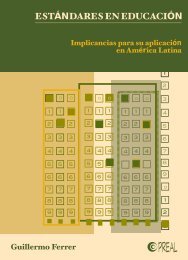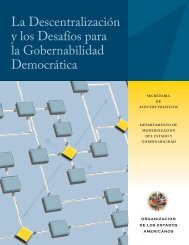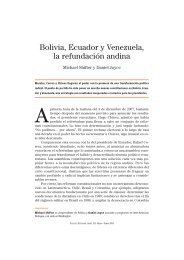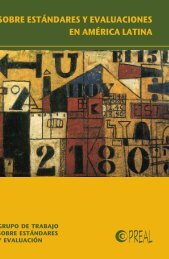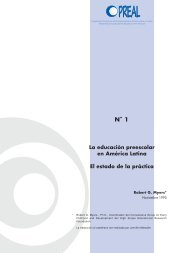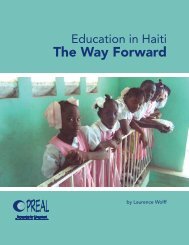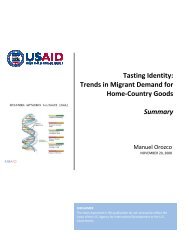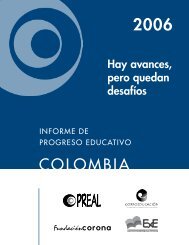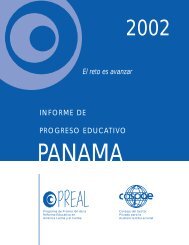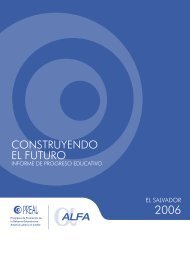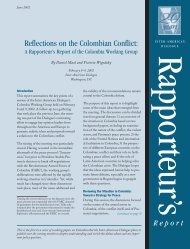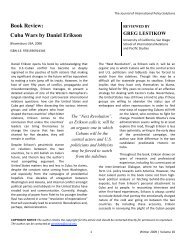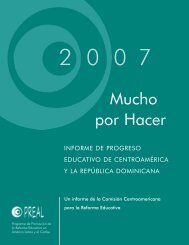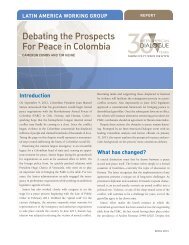Inter-American Dialogue
Inter-American Dialogue
Inter-American Dialogue
Create successful ePaper yourself
Turn your PDF publications into a flip-book with our unique Google optimized e-Paper software.
“Colombia's core,<br />
underlying problem is<br />
one of state authority<br />
and the maintenance<br />
of public order. The<br />
critical problem is the<br />
capacity to govern…<br />
10<br />
A comprehensive<br />
approach––one that<br />
embraces military,<br />
political, economic, and<br />
social elements––can<br />
best contribute to a<br />
durable and effective<br />
solution.<br />
”<br />
(Toward Greater Peace and<br />
Security in Colombia,<br />
<strong>Inter</strong>-<strong>American</strong><br />
<strong>Dialogue</strong> and Council<br />
on Foreign Relations Task<br />
Force Report)<br />
INTER-AMERICAN DIALOGUE<br />
2000 Program Report<br />
the Center for Latin <strong>American</strong> and<br />
Caribbean Studies at Florida <strong>Inter</strong>national<br />
University, the Institute for<br />
Iberoamerican Studies in Hamburg, and<br />
the Secretaria de la Integración Centro<br />
<strong>American</strong>a (SICA), based in San Salvador––was<br />
organized by the <strong>Dialogue</strong><br />
and brought 150 public and private sector<br />
participants from the seven Central<br />
<strong>American</strong> countries, as well as from<br />
Mexico, Venezuela, Uruguay, Europe,<br />
and the United States.<br />
� On April 6 and 7, the <strong>Dialogue</strong>’s Central<br />
America program joined the Canadian<br />
Foundation for the Americas (FOCAL)<br />
and the Central <strong>American</strong> Bank for Economic<br />
Integration (CABEI) in hosting a<br />
meeting with public and private leaders<br />
from Central America, the United States,<br />
and Canada at CABEI headquarters in<br />
Tegucigalpa, Honduras. Participants<br />
sought to identify mechanisms to promote<br />
Central <strong>American</strong> integration and<br />
the region’s insertion into the global<br />
economy. The <strong>Dialogue</strong>, FOCAL, and<br />
CABEI plan to organize a similar meeting<br />
in early 2001, and to develop policy<br />
recommendations for the Central <strong>American</strong><br />
governments and the international<br />
community.<br />
� President Miguel Angel Rodríguez of<br />
Costa Rica led a roundtable discussion on<br />
May 8 co-hosted with the Brookings<br />
Institution and Carnegie Endowment.<br />
� In the spring, the <strong>Dialogue</strong> and the<br />
Tomás Rivera Policy Institute (TRPI)<br />
organized two roundtable discussions and<br />
published a series of working papers on<br />
the potential contribution of remittances<br />
to social and economic development in<br />
Latin America and the Caribbean—as<br />
well as to the economic and social wellbeing<br />
of Latino communities in the<br />
United States. Remittances from the<br />
United States to Mexico and Central<br />
America alone amount to nearly $10 bil-<br />
lion a year. In several Latin <strong>American</strong><br />
and Caribbean countries, remittances<br />
rival inflows from trade and investment.<br />
� In addition to hosting events, the Central<br />
America program represented the <strong>Dialogue</strong><br />
in various conferences and talks<br />
sponsored by public, private and academic<br />
institutions. <strong>Dialogue</strong> expertise was<br />
sought on issues ranging from family<br />
remittances to the current political crisis<br />
in Nicaragua, regional boundary conflicts<br />
and disputes, and the state of democracy<br />
after the region’s civil wars. In addition,<br />
<strong>Dialogue</strong> staff were interviewed by Central<br />
<strong>American</strong> and U.S. journalists,<br />
including the Nicaraguan TV program<br />
Puntos de Encuentro, WorldNet, and<br />
Voice of America.<br />
� The Central America program staff also<br />
published widely, including a co-authored<br />
chapter, “From Family Ties to Ethnic<br />
Lobbies,” in, Latinos and Foreign Policy<br />
(Rowman and Littlefield, 2000); “De los<br />
lazos familiares a los vínculos transnacionales:<br />
el impacto de las remesas familiares<br />
en Latinoamérica” in Pensamiento<br />
Propio; and “Violence, Memory and History<br />
in Central America” in Bajo El Volcán<br />
(Mexico City).<br />
Chile<br />
� On March 23, the <strong>Dialogue</strong> joined<br />
Brookings Institution and Carnegie<br />
Endowment for <strong>Inter</strong>national Peace to<br />
organize a breakfast session on the challenges<br />
facing the new government of<br />
Ricardo Lagos in Chile. The discussion<br />
was led by Genaro Arriagada, former<br />
minister of government and ambassador<br />
to the United States, and Andrés Allamand,<br />
founder of the center-right<br />
National Renovation Party (RN).<br />
� IDB President Enrique Iglesias joined<br />
the <strong>Dialogue</strong> in hosting a dinner on June




